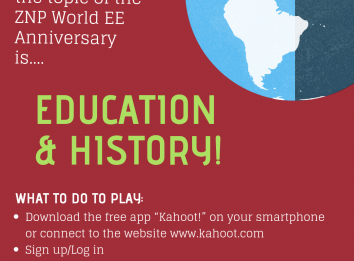

Today, 14th October, 41 years ago in Tbilisi, Georgia (ex USSR) was beginning a very important international conference. Delegates from 68 countries, as well as representatives and observers from international agencies, programmes, intergovernamental and non-governamental organisations participated. In total 265 delegates and 65 representatives took part in it. It was the first intergovernamental conference on Environmental Education, organised by the United Nations Education, Scientific and Cultural Organisation (UNESCO) in cooperation with the UN Environment Programme (UNEP).
The conference lasted 13 days, until 26th October, and ended with the Tbilisi Declaration, that noted the unanimous accord in the important role of environmental education (EE) in the preservation and improvement of the world’s environment, and the balanced development of the world’s communities as well.
The Declaration defines the goals of EE and suggests criteria and guidlines that should be adopted to achieve them at any level – national, regional, and global. It is admitted that it’s unrealistic to separate the biological and physical natural basis of the human environment from the ethical, social, cultural and economic implications of human activities. It defines the EE as a result of the reorientation and dovetailing of different disciplines and experiences, and sets as the main aim of EE the capacity of making individuals and communities understand the natural complexity of the environment. Furthermore, the Declaration defines the EE as one of the main tools to show and increase the awareness of the economic, political and ecological interdependence, proper of the modern society. In this global community, where decisions and actions by different nations can have international repercussions, the EE should help to create a sense of responsibility and solidarity among countries and regions. But most of all, the EE should provide the necessary knowledge and integrated perception to interpret global phenomena and supply a wide range of skills required in the devising and application of effective solutions to environmental problems, creating new patterns of behaviour of individuals and societies. Finally, it declares that all educational actions must be linked with legislation, policies, measures of control, and the decisions that governments may adopt in order to make an effective contribution to the improvement of human environment.
In that moment, a part of our history was written and nowadays, every year from 14 to 26 October, universities, schools, parks, environmental education centres, public institutions, associations, museums, municipalities etc. should organize dedicated events to highlight the importance of EE and that conference.
From today to 26th October, every day you’ll find here and on our Facebook and Instagram pages funny quizzes and games online to know more about environmental issues. You can play everywhere and whenever you want. Follow the anniversary!
Today the topic is… Education and History! Enjoy our quiz on Kahoot.
What to do to play:
1. Download the free app “Kahoot!” on your smartphone or connect the the website www.kahoot.com
2. Sign up/Log in
3. Search for “ZNP World EE Day 2018” or connect with the link https://play.kahoot.it/#/k/c304e92b-c406-4d9b-ab22-925bc60c4a46
4. Play!
Made by volunteer E. Di Marco
Zemaitija National Park Directorate
Didžioji str. 10, Plateliai, LT-90420, Plungės dstr., Lithuania
Company code: 191440964
VAT code: LT914409610
The founder is the State Service of Protected Areas under the Ministry of Environment.
Website part-financed by the European Union 2014-2020. Interreg V-A South Baltic Cross Border Cooperation Program.
